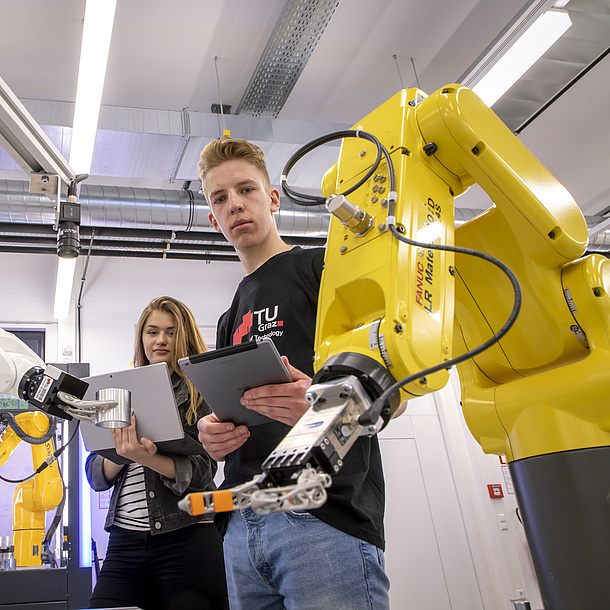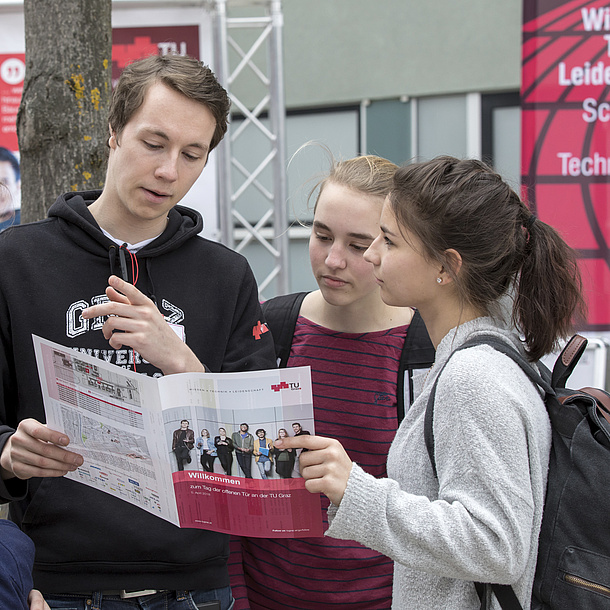- Duration of study: 6 semesters
- ECTS credit points: 180
- Academic degree: Bachelor of Science (BSc)
- Language of instruction: German
The Bachelor's Programme
In the Bachelor's Degree Programme in Digital Engineering, you will receive an interdisciplinary education in the fields of electrical engineering, mechanical engineering and computer science. This programme emphasises basic and method-oriented training in the respective subject areas and combinations thereof.
You will become familiar with a wide range of topics, including circuitry, measurement technology, programming, mechanics, thermodynamics, etc. and learn how to apply your knowledge to practical examples of engineering. You will also deepen your mathematical knowledge and learn signal representation and signal processing methods and possibilities.
You will acquire the knowledge necessary for you to understand complex technical processes and to be able to independently design and carry out new production processes. In this way, you will contribute to the development of future technologies in the areas of mobility, energy supply, logistics, or robotics.
Already during your studies, you can apply the skills you have acquired in practical projects that are offered as part of the bachelor paper. Various laboratory exercises are offered to guarantee that you receive highly practical training.
The TU Graz Student Teams offer you another opportunity to work with other researchers and create new technologies. The Autonomous Racing Team has set the goal of developing autonomous vehicles. This team regularly participates in international competitions. The GRIPS and TEDUSAR teams design, programme and control autonomous robots that will find their way into companies and society in the future.
Play video
Studying Digital Engineering
You will deepen your knowledge in the following subject areas:
Electrical Engineering: In addition to gaining basic knowledge about electrical engineering and electrical drives, you will also learn more about circuit technology (e.g. electronics and electrical networks), measurement technology and work in the laboratory.
Mechanical Engineering: You will become familiar with the basics of mechanical engineering and the mechanics of materials, as well as acquire extensive fundamental knowledge in the subject areas of thermodynamics, machine dynamics, fluid mechanics and heat transfer.
Computer Science: You will receive an introduction to basic knowledge in computer science and learn more about object-oriented programming. In addition, you will become familiar with data structures, algorithms and networks.
Mathematics: You will learn basic mathematical branches that are relevant for computer science, such as numerical computation, linear algebra and analysis and take a closer look at mathematical topics used in engineering to describe, analyse and simulate dynamic systems.
Signals and Systems: You will learn how signals are processed and become familiar with the underlying theory, with signal transmission and process regulation. At the same time, you will learn how to use methods to describe complex systems and to influence them in specific ways.
What will I have to do in the first semesters? How much practice can I expect? And what can I actually do with my degree when I've finished? Check what you expect!
A student and a lecturer will take time for all your questions and you will get to know TU Graz during on-site appointments. Up to 10 persons can participate at each date.
Contact: lse@tugraz.at

The exceptional number of disciplines involved in the Bachelor’s Degree Programme in Digital Engineering is unique in the German-speaking world. The specialised, basic education is provided by three faculties.
This programme creates an interface between the engineering sciences and digital technologies, enabling graduates of the Digital Engineering degree programme to develop systems and processes that drive the digital transformation in business and society. A central focus is placed on conducting research on and finding solutions to complex engineering problems in many individual disciplines.
Research in this area generally is conducted on
- modelling and simulating multi-physical systems,
- systematically designing controls for networked processes and
- applying algorithms that improve memory and runtime.
Research examples include
- the holistic design and development of micromechanical systems in integrated circuits,
- the automated detection of material damage in complex mechanical structures such as railway chassis, and
- the introduction of distributed control algorithms into cooperative robot systems.
Admission
Requirements for admission to a bachelor's degree programme at TU Graz
Summer semester 2026
Admission period: 7 January to 5 February 2026
Winter semester 2026/27
Admission period: 6 July to 5 September 2026
Contact study@tugraz.at
Perspectives for Graduates
Graduates of the Bachelor's Degree Programme in Digital Engineering are in high demand as experts for complex technical systems. They develop technologies that will be used in the future, for example, in the fields of autonomous driving and medical technology. They also conduct research intelligent energy networks and innovative drive concepts. They optimise or design and implement new algorithms for production processes, which are also used in industry.
Not only can you pursue a scientific career at research institutions and universities, but your expertise is also in demand in industrial companies. Due to the interdisciplinary education, you can work in numerous industries. Your knowledge will find particular application
- in mechanical engineering
- in logistics
- in the automotive industry, as well as
- in the field robotics.
While it is possible to directly begin your professional career after graduation, you will also qualify to enter numerous master's degree programmes at TU Graz and other renowned universities.
After completing the bachelor's degree programme, you can enrol in the following master’s degree programmes without further requirements:
- Advanced Materials Science
- Digital Engineering
- Electrical and Electronics Engineering
- Information and Computer Engineering
Information on other master's degree programmes with requirements you can find on the respective pages for the master’s degree programmes.
In addition, the bachelor's degree offers you the opportunity to apply internationally for master's degree programmes.




